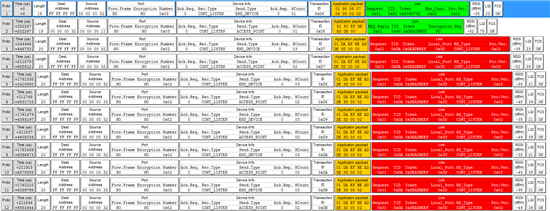Hello.
I'm using Simpliciti 1.1.1 (downloaded from here http://www.ti.com/tool/simpliciti) on CC430F5137 on CCS Version: 5.4.0.00091.
I've tried Peer-2-Peer project first - it worked fine, but I had to make some changes specified here http://e2e.ti.com/support/low_power_rf/f/155/p/79691/285098.aspx#285098.
Now I'm trying to launch "Access Point as Data Hub". I downloaded "main_AP_Async_Listen.c" into AP-device with address:
const addr_t lAddr = {0x00, 0x00, 0x00, 0x11};
// set device address
SMPL_Ioctl(IOCTL_OBJ_ADDR, IOCTL_ACT_SET, (addr_t*) &lAddr);
I downloaded "main_manyEDs.c" into one ED-device with address
const addr_t lAddr = {0x00, 0x00, 0x00, 0x33};
// set device address
SMPL_Ioctl(IOCTL_OBJ_ADDR, IOCTL_ACT_SET, (addr_t*) &lAddr);
Then I powered AP and ED. Led's on ED are blinking - it means that this cycle is running:
while (SMPL_SUCCESS != SMPL_Init(sCB))
{
toggleLED(1);
SPIN_ABOUT_A_SECOND;
}
It means, that "SMPL_Init(sCB)" don't returns "SMPL_SUCCESS". I tryed to sniff transmitted message with other device and RF-studio with same radio settings as ED has:
14:51:19.719 | 65535 | ff ff 00 00 00 33 03 01 d8 01 90 08 07 06 05 02 02
14:51:21.686 | 65535 | ff ff 00 00 00 33 03 01 d9 01 90 08 07 06 05 02 02
14:51:23.647 | 65535 | ff ff 00 00 00 33 03 01 da 01 90 08 07 06 05 02 02
14:51:25.622 | 65535 | ff ff 00 00 00 33 03 01 db 01 90 08 07 06 05 02 02
14:51:27.580 | 65535 | ff ff 00 00 00 33 03 01 dc 01 90 08 07 06 05 02 02
14:51:29.549 | 65535 | ff ff 00 00 00 33 03 01 dd 01 90 08 07 06 05 02 02
14:51:31.516 | 65535 | ff ff 00 00 00 33 03 01 de 01 90 08 07 06 05 02 02
14:51:33.480 | 65535 | ff ff 00 00 00 33 03 01 df 01 90 08 07 06 05 02 02
14:51:35.451 | 65535 | ff ff 00 00 00 33 03 01 e0 01 90 08 07 06 05 02 02
But AP doesn't enter in any subroutine of:
while (1)
{
if (sJoinSem && (sNumCurrentPeers < NUM_CONNECTIONS))
{
.......
}
if (sPeerFrameSem)
{
......
}
if (BSP_BUTTON1())
{
.......
}
else
{
........
}
BSP_ENTER_CRITICAL_SECTION(intState);
if (sBlinky)
{
...........................
}
BSP_EXIT_CRITICAL_SECTION(intState);
}
}
What do I wrong? Which steps I have to do, to correct the mistake?


